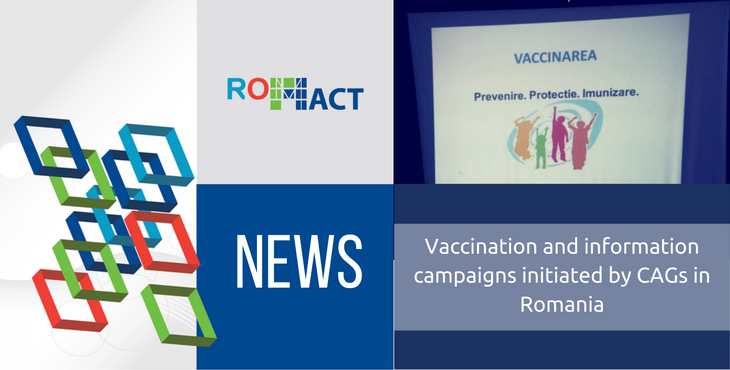Vaccination and information campaigns initiated by CAGs in Romania
There is progress in ROMACT participant municipalities as they implement a new vaccination and information campaign.
Due to the time required to clear necessary procedures for infrastructure projects, the wait can be rather long, so the Community Action Groups (CAG) in several locations in Romania chose to address some of their short-term priorities with measures that require little or no budgeting and which can be conducted immediately.
Such was the case in Calvini and Ramnicelu where vaccination and information campaigns were led over the past few months. The vaccination and information campaigns address health-related priorities that were identified by the CAG and this action demonstrates that the Roma community can be engaged and mobilised with tangible results achieved.
On the 7th September 2016 Calvini began their vaccination information campaign which was held for the Roma community in the Day Centre of Bascenii de Jos.
A representative of the Public Health Directorate provided interactive explanations on how vaccines work; what diseases can be prevented with vaccines; offered information on the progression of diseases if they are not prevented through vaccination; and finally addressed the impacts of diseases spreading non-vaccinated populations.
Along with the Roma Health mediator and the community nurse around 20 Roma women attended the information campaign. This action was included under the Health chapter of the Local Action Plan, and was revised in the beginning of 2016 to include the priorities of the CAG which was adopted by the local council of Calvini on 18 March 2016.
More on ROMACT in Calvini.
In Ramnicelu, the Community Action Group mobilised citizens from the municipality for a vaccination campaign conducted over 5 days (from 30 August to 3 September 2016).
The programme of activities was delivered by the general practitioner with the assistance of community nurses and of the health mediator. The members of the CAG were instructed about available vaccines and a survey was conducted among families with infants to assess the vaccine needs in the community.
Within the programme activity, parents were also informed about the importance of vaccination and health-related risks linked to non-vaccination, which led in most cases to their agreement to bring their child for vaccination. Around 55 children were identified as needing vaccination against rubella, measles and mumps (MMR), while 25 needed the diphtheria, tetanus, acellular pertussis-polio-Haemophilus B hepatitis B vaccine (DTPa-VPI-Hib-Hep).

